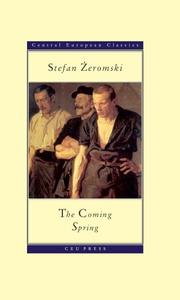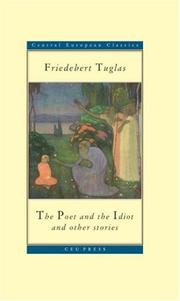| Listing 1 - 10 of 60 | << page >> |
Sort by
|
Book
ISBN: 9782296060197 Year: 2008 Publisher: Paris : L'Harmattan,
Abstract | Keywords | Export | Availability | Bookmark
 Loading...
Loading...Choose an application
- Reference Manager
- EndNote
- RefWorks (Direct export to RefWorks)
Book
ISBN: 9786155225833 6155225834 9786155225826 6155225826 Year: 2014 Publisher: Budapest, Hungary : Central European University Press,
Abstract | Keywords | Export | Availability | Bookmark
 Loading...
Loading...Choose an application
- Reference Manager
- EndNote
- RefWorks (Direct export to RefWorks)
In this novel, written by the esteemed novelist in 1901, a provincial composer and organist from Croatia struggles to find his way along the perilous frontier between the worlds of artistic vocation and humdrum family life. The local kapellmeister—-a Czech, in good Habsburg tradition, and a confidant of Gaj and Palacky, influential politicians of the time—-recognizes young Amadej Zlatanic as a prodigy and persuades the stingy mayor and stubborn parish priest to pack the teenager off to the conservatory in Prague. After several years of sordid student purgatory, Amadej returns to Croatia—-ready for love and ready to make great art.The world of Central Europe in the 1860s flows past, and Amadej tries to keep abreast of political change. At the same time he ducks and dodges predatory relatives and townspeople in his native district, to which he has returned for the sake of employment. Despite his marriage to the impressionable and vulnerable local beauty, Adelka, and his devotion to their daughter Veruska, Amadej is sorely troubled by the political corruption and isolation of Croatia. His wife takes ill and his family is poor. Yet ultimately it is the vulgar, populist notion of Croatian "identity"—-symbolized by the worship of the tamburica, a local musical instrument—-that crushes Amadej's career. As it does so, he contemplates the two worlds of national greatness, amidst the Croatian national awakening, and international fame. Finally, frustrated beyond relief by unsuccessful affairs both amorous and professional, and tortured by the philistinism surrounding him, Amadej leaves the world of sanity for a mind-blowing descent into the maniacal and inescapable world of hallucination, paganism, and paranoia.
Book
ISBN: 2915379076 Year: 2004 Publisher: Rennes : Marines,
Abstract | Keywords | Export | Availability | Bookmark
 Loading...
Loading...Choose an application
- Reference Manager
- EndNote
- RefWorks (Direct export to RefWorks)
Book
ISBN: 2845611714 9782845611719 Year: 2005 Volume: 19 Publisher: La Crèche: Geste,
Abstract | Keywords | Export | Availability | Bookmark
 Loading...
Loading...Choose an application
- Reference Manager
- EndNote
- RefWorks (Direct export to RefWorks)
La Séparation des Eglises et de l'Etat a cent ans. Elle est considérée comme un trait essentiel de la laïcité à la française : l'Etat a cessé de reconnaître et de subventionner les cultes, mais il en garantit le libre exercice et assure la liberté de conscience. Née clans la douleur et les affrontements, la loi de 1905 a finalement été acceptée par l'Eglise catholique et a donné à la France ce durable apaisement religieux dont elle était en quête depuis la Révolution française. Cette pièce de notre patrimoine est pourtant mal connue, dans son contenu aussi bien que dans ses origines, son application, sa capacité à répondre aux défis du XXI siècle. Ce petit livre souhaite répondre à ces multiples questions
Political History - French Secularism - Early 20th Century --- Church and state --- France --- History

ISBN: 9786155211300 9786155211300 9786155211300 6155211302 1281268690 9786611268695 1429498870 9781429498876 9789637326899 9637326898 Year: 2007 Publisher: New York ; Budapest : Central European University Press,
Abstract | Keywords | Export | Availability | Bookmark
 Loading...
Loading...Choose an application
- Reference Manager
- EndNote
- RefWorks (Direct export to RefWorks)
The Coming Spring (Przedwiosnie), Zeromski's last novel, tells the story of Cezary Baryka, a young Pole who finds himself in Baku, Azerbaijan, then a predominantly Armenian city, as the Russian Revolution breaks out. He becomes embroiled in the chaos caused by the revolution, and barely escapes with his life. Then, he and his father set off on a horrendous journey west to reach Poland. His father dies en route, but Cezary makes it to the newly independent Poland. Cezary sees the suffering of the poor, yet his experiences in the newly formed Soviet Union make him suspicious of socialist and communist solutions. He is an outsider among both the gentry and the working classes, and he cannot find where he belongs. Furthermore, he has unsuccessful and tragic love relations. The novel ends when, despite his profound misgivings, he takes up political action on behalf of the poor. Zeromski, whose vivid, assured style is instantly recognizable, was a writer with a strong social conscience, taking up the concerns of the poor and downtrodden.
Polish fiction. --- Polish literature. --- Polish literature --- Early 20th century, Fiction, Poland. --- Polish fiction --- Translations into English.
Book
ISBN: 9791036563027 9568416994 Year: 2020 Publisher: Santiago : Ariadna Ediciones,
Abstract | Keywords | Export | Availability | Bookmark
 Loading...
Loading...Choose an application
- Reference Manager
- EndNote
- RefWorks (Direct export to RefWorks)
El interés de un análisis histórico de los origenes del PS reside en la importancia de examinar la primera experiencia de construcción de un partido político obrero independiente, gestada por la clase trabajadora argentina en un período muy temprano de su historia. Es por ello que, si bien dedica una atención especial a las cuestiones teóricas y programáticas, así como a los desarrollos organizativos, este libro no propone una historia puramente intelectual o ideológica, sino que busca entender el desenvolvimiento del PS como parte de la historia viva de la clase trabajadora y de sus experiencias de lucha. Se trata de advertir las características del proceso de desarrollo de la clase obrera en el marco de una economia capitalista, la conformación de sus organizaciones de lucha, y en el contexto de ese desenvolvimiento las características de su vinculación con los grupos políticos activos en el seno de las izquierdas. La pregunta que busca responder este trabajo, en otros términos, es cuál fue el lugar del PS en el proceso de estructuración de la conciencia de clase del proletariado argentino.
History --- socialismo --- marxismo --- Argentina --- movimiento obrero --- principios del siglo XX --- socialism --- Marxism --- labor movement --- early 20th century

ISBN: 6155211272 1281376884 9786611376888 1429498862 9781429498869 9789637326882 963732688X 9786155211270 Year: 2007 Publisher: New York : Central European University Press,
Abstract | Keywords | Export | Availability | Bookmark
 Loading...
Loading...Choose an application
- Reference Manager
- EndNote
- RefWorks (Direct export to RefWorks)
Estonian literature in its written form is little more than a century old. As Estonia was part of the Russian Empire, then of the Soviet Union, it is something of a miracle that the powerful presence of the Baltic Germans, the periods of Russification, and other more subtle forms of cultural pressure, have not eradicated Estonian as a serious literary language. One of the central figures to credit for this was Friedebert Tuglas. The nine stories, and the essay, featured here were written during the World War One, or in the first years of Estonian independence in the early 1920s. They reflect the troubled spirit of the times, but exhibit the influence of a wide selection of writers, ranging from O. Wilde and M. Gorky, to F. Nietzsche and Edgar Allan Poe. The subject matter of Tuglas' stories represented here ranges from a starving prisoner, via a luckless pharmacist's hallucinations from childhood, a wandering soldier who encounters weird spirits, to a young man sitting in a park, accosted by a devilish lunatic who wants to introduce a new brand of devil worship to the world.
Estonian fiction. --- Estonian literature. --- Estonian literature --- Észt irodalom --- regeny. --- Early 20th century, Estonia, Fiction. --- Estonian fiction
Book
ISBN: 9782271066824 Year: 2008 Publisher: Paris : CNRS,
Abstract | Keywords | Export | Availability | Bookmark
 Loading...
Loading...Choose an application
- Reference Manager
- EndNote
- RefWorks (Direct export to RefWorks)
Comment la philosophie peut-elle penser le droit ? Qu'en est-il, particulièrement, de la prétention que j'émets à la possession de telle chose et de l'obligation que j'ai d'accomplir certains actes ? Disciple parmi les plus remarquables de Husserl, premier phénoménologue à s'intéresser de près à la sphère juridique, Adolf Reinach (1883-1917), prématurément disparu, est l'auteur d'une théorie des actes sociaux " dans laquelle on a pu voir une anticipation du " tournant pragmatique " opéré dans la philosophie du langage de John L. Austin. Il restait à étudier cette entreprise exceptionnelle pour elle-même, mais aussi en relation aux grandes synthèses classiques (Kant) ou contemporaines (Kelsen) en matière de philosophie (lu droit. C'est ce (lue fait le présent ouvrage dirigé par Jocelyn Benoist et Jean-François Kervégan ; les contributions qu'il regroupe, dues aux meilleurs spécialistes, apportent un éclairage différent sur l'opposition usuelle entre droit naturel et positivisme juridique, et renouvellent entièrement les débats les plus actuels sur la légitimité et le contenu du droit.
Reinach, Adolf, --- Law --- Philosophy --- German Philosophy of Law - Phenomenology - Early 20th Century - Criticism --- Reinach, Adolf (1883-1917) --- Phénoménologie --- Droit --- Critique et interprétation --- Philosophie --- 20e siècle
Book
ISBN: 2747584232 Year: 2005 Publisher: Paris : Harmattan,
Abstract | Keywords | Export | Availability | Bookmark
 Loading...
Loading...Choose an application
- Reference Manager
- EndNote
- RefWorks (Direct export to RefWorks)
Love --- Hate --- Love-hate relationships --- Amour --- Haine --- Amour et haine --- Psychological aspects. --- Psychological aspects --- Aspect psychologique --- History of Psychology --- Early 20th Century
Book
ISBN: 9633863074 Year: 2022 Publisher: Budapest : Central European University Press,
Abstract | Keywords | Export | Availability | Bookmark
 Loading...
Loading...Choose an application
- Reference Manager
- EndNote
- RefWorks (Direct export to RefWorks)
"A systematic comparison of the dominant ethnic historio-graphic models and divergences of 19th- and 20th-century Greek, Bulgarian, Serbian, Albanian, Romanian, Turkish, and Russian intellectuals with regard to the ambiguous inheritance of Byzantium"--
| Listing 1 - 10 of 60 | << page >> |
Sort by
|

 Search
Search Feedback
Feedback About UniCat
About UniCat  Help
Help News
News